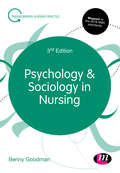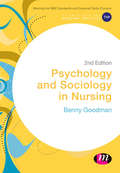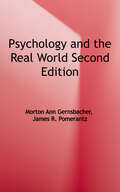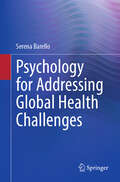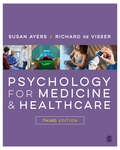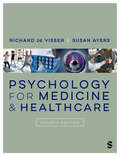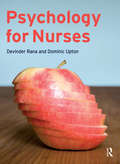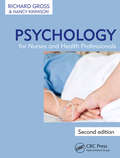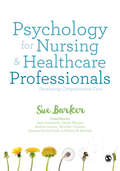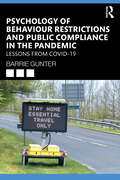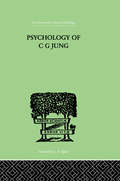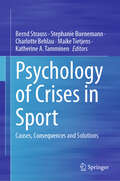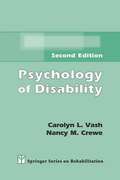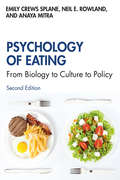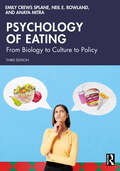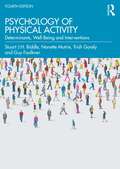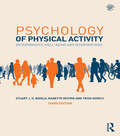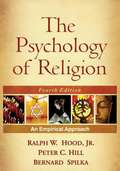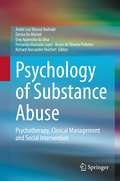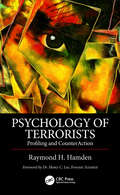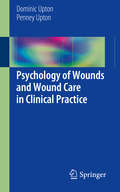- Table View
- List View
Psychology and Sociology in Nursing (Transforming Nursing Practice Series)
by Benny GoodmanThis book explores sociology and psychology relevant to nursing and explains why it is so important to understand these disciplines in order to be a good nurse. It is written specifically for nursing students, and clearly explains the key concepts using nursing case studies and examples. Chapters move from individual and personal issues onto society as a whole and explore the psychological and sociological basis that underpins all aspects of nursing practice. Key features: All content linked to the sociological and psychological requirements in the NMC standards of proficiency for registered nurses Activities to help build critical thinking, independent learning and decision-making skills Case studies and scenarios that link sociological and psychological theory to nursing practice A key text for nursing students in all fields of practice
Psychology and Sociology in Nursing (Transforming Nursing Practice Series)
by Benny GoodmanThis book explores sociology and psychology relevant to nursing and explains why it is so important to understand these disciplines in order to be a good nurse. It is written specifically for nursing students, and clearly explains the key concepts using nursing case studies and examples. Chapters move from individual and personal issues onto society as a whole and explore the psychological and sociological basis that underpins all aspects of nursing practice. Key features: All content linked to the sociological and psychological requirements in the NMC standards of proficiency for registered nurses Activities to help build critical thinking, independent learning and decision-making skills Case studies and scenarios that link sociological and psychological theory to nursing practice A key text for nursing students in all fields of practice
Psychology and Sociology in Nursing (Transforming Nursing Practice)
by Benny GoodmanNurses have to be aware of a range of sociological and psychological issues in order to provide holistic care. This book explores sociology and psychology relevant to nursing and explains why it is so important to understand these disciplines in order to be a good nurse. It is written specifically for nursing students, and clearly explains the key concepts using nursing case studies and examples. Chapters move from individual and personal issues onto wider society as a whole and explore the psychological and sociological basis of all aspects of nursing practice.
Psychology and the Real World
by Morton Ann Gernsbacher James R. PomerantzLearn about some of the most important psychology research of our time from the actual scientists behind the studies as Psychology and the Real World devles into the research that has not only reshaped our understanding of brain, mind, and behavior, but has significantly changed the way we live our lives.
Psychology for Addressing Global Health Challenges
by Serena BarelloPsychology for Addressing Global Health Challenges is conceived as a pioneering volume that delves into the nexus between psychology and the paramount global health challenges of our era. With a deep focus on the Sustainable Development Goals (SDGs), this book is strategically crafted to empower psychologists, researchers, health practitioners, health managers and policy makers with the knowledge and tools essential for addressing pressing health issues on a global scale. By concentrating on the unique interplay between psychological factors and the health landscape, the volume seeks to equip students and professionals with actionable insights and evidence-based psychologically-rooted strategies for designing effective and human-centered interventions, and interdisciplinary insights to promote a systems-thinking approach to global health challenges. The primary objective is to harness the power of psychological science to foster positive behavioural change and sustainable practices, ultimately contributing to the advancement of a more equitable and sustainable world.
Psychology for Medicine and Healthcare
by Susan Ayers Richard de VisserAs our understanding of what constitutes ‘good health’ grows, so does our need to understand the psychological aspects of medicine and health, as well as the psychological interventions available in healthcare. This new edition of this bestselling textbook provides a comprehensive overview of the research, theory, application and current practices in the field, covering topics from epigenetics to social determinants of health and transdiagnostic approaches to mental health and everything in between. An essential read for all medicine and healthcare students, this text is now accompanied by a suite of online resources for all your learning needs.
Psychology for Medicine and Healthcare
by Susan Ayers Richard de VisserAs our understanding of what constitutes ‘good health’ grows, so does our need to understand the psychological aspects of medicine and health, as well as the psychological interventions available in healthcare. This new edition of this bestselling textbook provides a comprehensive overview of the research, theory, application and current practices in the field, covering topics from epigenetics to social determinants of health and transdiagnostic approaches to mental health and everything in between. An essential read for all medicine and healthcare students, this text is now accompanied by a suite of online resources for all your learning needs.
Psychology for Medicine and Healthcare
by Richard de Visser Susan AyersAs our understanding of what constitutes ‘good health’ grows, so does our need to understand the psychological aspects of medicine and health, as well as the psychological interventions available in healthcare. This bestselling textbook provides a comprehensive overview of research, theory, application, and current practices in the field. The new edition delves deeper into critical topics such as diversity and health inequalities, cultural influences on healthcare, the rise of digital healthcare solutions, and the well-being of healthcare practitioners. With updated case studies, research examples, and online resources, this essential text equips medical and healthcare students with the knowledge and tools to navigate the evolving landscape of health psychology. Richard de Visser is a Professor of Health Psychology at Brighton & Sussex Medical School. Susan Ayers is a Professor of Maternal and Child Health at City St George’s, University of London in the School of Health and Medical Sciences.
Psychology for Medicine and Healthcare
by Richard de Visser Susan AyersAs our understanding of what constitutes ‘good health’ grows, so does our need to understand the psychological aspects of medicine and health, as well as the psychological interventions available in healthcare. This bestselling textbook provides a comprehensive overview of research, theory, application, and current practices in the field. The new edition delves deeper into critical topics such as diversity and health inequalities, cultural influences on healthcare, the rise of digital healthcare solutions, and the well-being of healthcare practitioners. With updated case studies, research examples, and online resources, this essential text equips medical and healthcare students with the knowledge and tools to navigate the evolving landscape of health psychology. Richard de Visser is a Professor of Health Psychology at Brighton & Sussex Medical School. Susan Ayers is a Professor of Maternal and Child Health at City St George’s, University of London in the School of Health and Medical Sciences.
Psychology for Nurses
by Dominic Upton Devinder RanaThis text aims to be useful and relevant for student nurses from all backgrounds with a range of professional aspirations. It demonstrates the importance of psychology in both the nursing role and in health care in general.
Psychology for Nurses and Health Professionals
by Richard Gross Nancy KinnisonPsychology for Nurses and Health Professionals, Second Edition is an accessible guide providing comprehensive coverage of psychology for nurses and healthcare professionals in training and practice.Key features include: Fully updated and restructured to ensure content matches training requirements for nurses and healthcare practitioners Stronger focus on the biopsychosocial model, therapeutic relationships and self-awareness More examples to highlight application with theories demonstrated through scenarios relevant to practice Accessible style with critical discussion boxes, student diary entries, reflection points, summary boxes and glossary Free lecturer PowerPoints, extension material, MCQs and exercises available to download Written by the bestselling psychology author Richard Gross and Nancy Kinnison, an experienced nurse and lecturer, this is an essential guide to applying theoretical aspects of psychology to nursing and health care.
Psychology for Nursing and Healthcare Professionals: Developing Compassionate Care
by Sue BarkerFocusing in particular on compassionate care, this practical textbook covers all aspects of psychology relevant to nursing and healthcare students. Key Features include: Coverage of the most important core psychology concepts for students, directly linked to relevant practice contexts Case studies and scenarios from service users, carers, students and practitioners to help readers relate theory to practice Reflective activities to develop critical thinking with outline answers at the end of each chapter A glossary with definitions of key terms to further understanding.
Psychology for Nursing and Healthcare Professionals: Developing Compassionate Care
by Sue BarkerFocusing in particular on compassionate care, this practical textbook covers all aspects of psychology relevant to nursing and healthcare students. Key features include: Coverage of the most important core psychology concepts for students, directly linked to relevant practice contexts. Case studies and scenarios from service users, carers, students and practitioners to help readers relate theory to practice. Reflective activities to develop critical thinking with outline answers at the end of each chapter. A glossary with definitions of key terms to further understanding.
Psychology of Behaviour Restrictions and Public Compliance in the Pandemic: Lessons from COVID-19
by Barrie GunterThis volume examines the topic of compliance with COVID-19 restrictions, and the non-pharmaceutical measures taken by governments in attempts to bring the pandemic under control. Discovery that COVID-19 was largely transmitted through the air meant that public health strategies were needed to limit close physical contact between people. Epidemiological modelling offered initial interventions to tackle the rate of spread, but to be effective these measures were dependent on widespread public adoption and compliance. This book examines the key theories and empirical approaches to behavioural change and compliance, and reviews research on their relative effectiveness in driving public behaviour. Author Barrie Gunter considers four principal models used: nudge theory, social identity-group processes theory, theory of planned behaviour and the capability-opportunity-motivation-behaviour (COM-B) model. Gunter weighs the pros and cons of each, offers commentary on lessons that can be learned from their application during the pandemic, and what they may have to offer in a triangulated approach, theoretically, methodologically and in terms of policy making. Examining not just the extent of compliance but also the psychological drivers of this behaviour over time, this is essential reading for students and researchers in psychology, public health and medical sciences, and policy makers assessing government strategies, responses and performance.
Psychology of C G Jung (International Library Of Psychology Ser.)
by Jacobi, JolandeThis is Volume III of twelve in the Analytical Psychology Series. Originally published in 1942 the present work has grown out of a lecture given before a group of psychologists, physicians, and educators and this is the fifth edition giving a presentation of the elements of Jung’s psychology that is intended to give a concise picture, complete in itself, of the central content of the whole system, and above all to facilitate access to Jung's own extraordinarily voluminous works.
Psychology of Crises in Sport: Causes, Consequences and Solutions
by Bernd Strauss Stephanie Buenemann Charlotte Behlau Maike Tietjens Katherine A. TamminenThe book includes ideas and concepts from psychology in general, particularly sport psychology, and communication sciences, as well as applied sport psychology and case studies. In each chapter, the reader will first learn the theoretical and empirical background of concepts related to crises, and second, they will be introduced to how to apply this knowledge and methods to prevent and cope with crises. Throughout the book, well-known examples and case studies are addressed to gain a full understanding of crises.
Psychology of Disability (2nd edition)
by Nancy M. Crewe Carolyn L. VashThe latest edition, 20 years after the first, incorporates the many changes that have occurred in disability-related language, legislation, technology, and research. Its two sections focus first on the disability experience a chronicle of what it's like to be disabled and how objective and subjective experiences affect the basic functions of living, working, and playing and then on interventions a response to the problems and sources of psychological pain exposed by the discussions in the first section. Vash (a writer and consulting psychologist in Altadena, Calif. ) and Crewe (Michigan State U. ) see their work as both a textbook or collateral reading source for those studying the psychological aspects of disability, and a general resource for rehabilitation professionals.
Psychology of Eating: From Biology to Culture to Policy
by Neil Rowland Emily Splane Anaya MitraThe Psychology of Eating is the essential multi-disciplinary introduction to the psychology of eating, looking at the biological, genetic, developmental, and social determinants of how humans find and assimilate food. Thoroughly revised and updated, the new edition brings multi-faceted expertise to the topic of normal and dysfunctional food intake, juxtaposing "normal" eating, eating in environments of food scarcity, and the phenomenon of "abnormal" eating prevalent in many modern-day developed societies. Eating disorders are not a focus, but also emerge from, this approach. Key features include: A new expanded section considering the roles of business and government in creating and potentially solving the issue of "abnormal" eating Learning objectives, talking points, and end-of-chapter glossaries Chapter-by-chapter self-assessment questions. With questions of food production, food choice, and environmental sustainability becoming more critical in an increasingly populated world, this is crucial reading for undergraduate courses in Psychology and other disciplines with a holistic and critical thinking approach to the psychology of food intake.
Psychology of Eating: From Biology to Culture to Policy
by Anaya Mitra Neil E. Rowland Emily Crews SplaneThe Psychology of Eating is the essential multidisciplinary introduction to the psychology of eating, looking at the biological, genetic, developmental, and social determinants of how humans find and assimilate food.Thoroughly revised and updated, this new, third edition brings multifaceted expertise to the topic of normal and dysfunctional food intake, juxtaposing ‘normal’ eating, eating in environments of food scarcity, and the phenomenon of ‘abnormal’ eating prevalent in many modern-day developed societies. The book includes some discussion of eating disorders but takes a much broader approach to the psychology of eating. Key updates in this edition include: A new discussion of food allergies. A fully updated chapter on eating disorders, which includes discussion of binge-eating. Greater focus on junk food addition and updated information on epigenetics and the microbiome Featuring student-friendly materials such as learning objectives, talking points, glossaries, and self-assessment questions, this book is essential reading for students of psychology, eating behavior, or health sciences. It will also be useful reading for professionals in health psychology and anyone supporting those with eating disorders and obesity.
Psychology of Physical Activity: Determinants, Well-Being and Interventions
by Stuart J. Biddle Nanette Mutrie Trish Gorely Guy FaulknerThe positive benefits of physical activity for physical and mental health are now widely acknowledged, yet levels of physical inactivity continue to be a major concern throughout the world. Understanding the psychology of physical activity has therefore become an important issue for scientists, health professionals and policy-makers alike as they address the challenge of behaviour change. Psychology of Physical Activity provides comprehensive and in-depth coverage of the fundamentals of exercise psychology, from mental health, to theories of motivation and adherence, and to the design of successful interventions for increasing participation. Now publishing in a fully revised, updated and expanded fourth edition, Psychology of Physical Activity is still the only textbook to offer a full survey of the evidence base for theory and practice in exercise psychology, and the only textbook that explains how to interpret the quality of the research evidence. As the field continues to grow rapidly, the new edition expands the behavioural science content of numerous important topics, including physical activity and cognitive functioning, automatic and affective frameworks for understanding physical activity involvement, new interventions designed to increase physical activity (including use of new technologies), and sedentary behaviour. A full companion website offers useful features to help students and lecturers get the most out of the book during their course, including multiple-choice revision questions, PowerPoint slides and a test bank of additional learning activities. Psychology of Physical Activity is the most authoritative, engaging and up-to-date book on exercise psychology currently available. It is essential reading for all students working in behavioural medicine, as well as the exercise and health sciences.
Psychology of Physical Activity: Determinants, Well-Being and Interventions
by Stuart J. Biddle Nanette Mutrie Trish GorelyThe positive benefits of physical activity for physical and mental health are now widely acknowledged, yet levels of physical inactivity continue to increase throughout the developed world. Understanding the psychology of physical activity has therefore become an important concern for scientists, health professionals and policy-makers alike. Psychology of Physical Activity is a comprehensive and in-depth introduction to the fundamentals of exercise psychology, from theories of motivation and adherence to the design of successful interventions for increasing participation. Now in a fully revised, updated and expanded third edition, Psychology of Physical Activity is still the only textbook to offer a full survey of the evidence-base for theory and practice in exercise psychology, and the only textbook that explains how to interpret the quality of the research evidence. With international cases, examples and data included throughout, the book also provides a thoroughly detailed examination of the relationship between physical activity and mental health. A full companion website offers useful features to help students and lecturers get the most out of the book during their course, including multiple-choice revision questions, PowerPoint slides and a test bank of additional learning activities. Psychology of Physical Activity is the most authoritative, engaging and up-to-date introduction to exercise psychology currently available. It is essential reading for all students working in exercise and health sciences.
Psychology of Religion, Fourth Edition
by Ralph Hood Jr. Peter HillScholarly and comprehensive yet accessible, this state-of-the-science work is widely regarded as the definitive psychology of religion text. The authors synthesize classic and contemporary empirical research on numerous different religious groups. Coverage includes religious thought, belief, and behavior across the lifespan; links between religion and biology; the forms and meaning of religious experience; the social psychology of religious organizations; and connections to morality, coping, mental health, and psychopathology. Designed for optimal use in advanced undergraduate- and graduate-level courses, every chapter features thought-provoking quotations and examples that bring key concepts to life. New to This Edition Revised and updated with the latest theories, methods, and empirical findings. Many new research examples. Restructured with fewer chapters for better 'fit' with a typical semester. More attention to the differences between religion and spirituality Covers emerging topics genetics and neurobiology, positive psychology, atheism, and more.
Psychology of Substance Abuse: Psychotherapy, Clinical Management and Social Intervention
by André Luiz Monezi Andrade Eroy Aparecida da Silva Denise De Micheli Fernanda Machado Lopes Bruno de Oliveira Pinheiro Richard Alecsander ReichertThis book is a guide for psychologists working with substance users in different healthcare settings, from private clinical practice to larger health institutions and community services. It presents a comprehensive overview of the different aspects involved with substance use disorders from a psychological perspective, from prevention to recovery. The volume offers an integrative view about neurobiological, behavioral and psychosocial aspects related to becoming a substance user; shows how psychological assessment tools can be used to diagnose substance use disorders; describes how different kinds of psychotherapy can be applied in the treatment of substance use disorders; and presents a range of evidence-based clinical and social interventions designed for both prevention and treatment of substance use disorders. Apart from covering the whole range of services related to the prevention, diagnosis and treatment of substance use disorders, the volume also shows how these issues can be approached from different theoretical perspectives within psychology, such as: Behavioral and Cognitive Psychology Neuropsychology Existential Psychology Phenomenology Psychoanalysis Analytical Psychology Community and Social Psychology Psychology of Substance Abuse: Psychotherapy, Clinical Management and Social Intervention will be a useful resource for psychologists and other health professionals working with substance users, as well as to undergraduate and graduate students looking for a comprehensive introduction to the psychology of substance abuse.
Psychology of Terrorists: Profiling and CounterAction
by Raymond H. HamdenThe Psychology of Terrorists examines the personality profile of the individual and categorizes the psychology of terrorists into four distinct profiles which are outlined and analyzed in detail. There are many books that cover social psychology and political violence and aggression, but few establish the mind-set of the terrorist as an individual. This includes taking into account personal experiences, and religious or political ideology for the purposes of understanding conceptual and tactical objectives and profiling terrorists to counter terrorist threats. <P><P>Dr. Raymond Hamden presents a unique look at terrorists as individuals with personal motives as well as those of principle. The book presents an analysis of terrorists without prejudice or bias for any political, religious, nationality, creed, or race. Too many times the world see experts focus on issues that are based on their own predispositions or partialities. Although there is criticism on the reliability of profiling, this research demonstrates validity and reliability. It is vital to understand terrorist motivations and this can only be achieved by "knowing" the terrorists' psychological character, looking at the individual terrorist, taking into account particular experiences, psychological makeup, background, and fundamentalist ideology. <P><P>The Psychology of Terrorists: Profiling and CounterAction will be a welcomed addition to psychologists, terrorism researchers, criminal profilers, investigators and intelligence professionals, counter- and anti-terrorism experts, as well as military, security, and law enforcement professionals tasked with protecting individuals from the various acts of terrorism, domestically and globally.
Psychology of Wounds and Wound Care in Clinical Practice
by Penney Upton Dominic UptonThis book addresses the psychological consequences of wounds and the psychological components of wound care, building on contemporary research evidence and presenting practical clinical guidelines. Particular emphasis is given to the psychological impact of both wounds and wound treatment. Implications for practice are discussed, making this book both educational and practical. Psychology of Wounds and Wound Care in Clinical Practice is aimed at clinicians, including GPs, vascular surgeons and physicians, nurses, especially tissue viability nurses, and podiatrists, and is also of interest to academic teachers and researchers.
